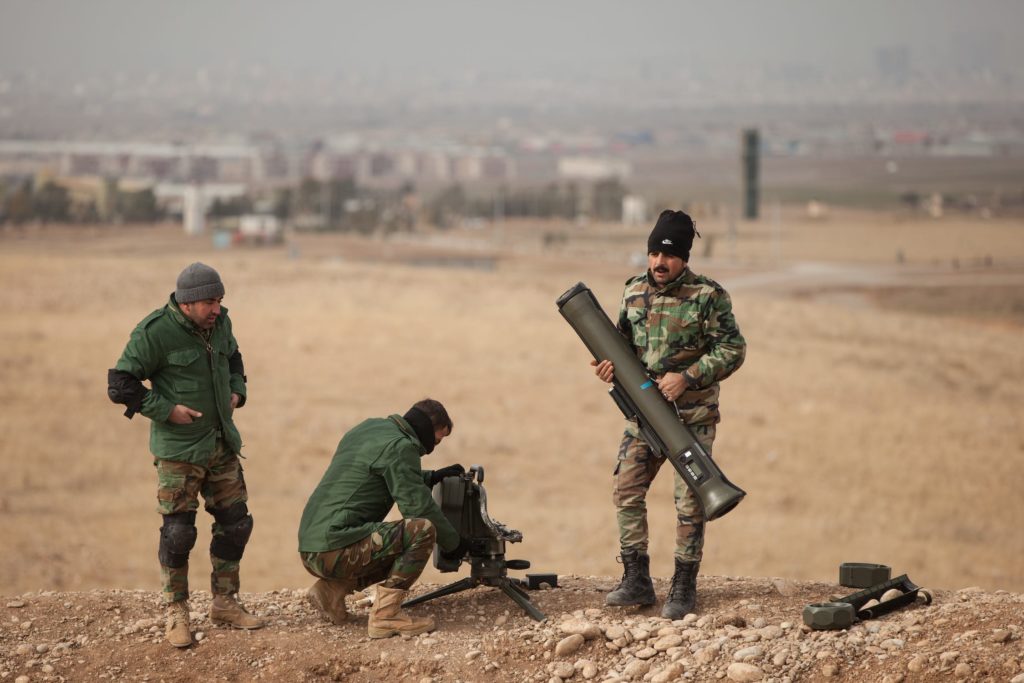SULAYMANIYAH/SLEMANI, Kurdistan Region of Iraq – The Patriotic Union of Kurdistan is willing to provide material aid to Syrian Kurdish forces if they are attacked by Turkey in northern Syria, a senior PUK Peshmerga official said.
Speaking to The Defense Post in northern Iraq, Mustafa Chawrash said the PUK would offer “anything that is within our capabilities” to assist the Syrian People’s Protection Units, or YPG, if a U.S. drawdown from Syria is met with a Turkish attack on the force.
Chawrash, head of the PUK Peshmerga’s administrative bureau and a veteran commander, said that his side would not be able to send fighters, but would be ready to provide materiel and financial aid, as well as medical assistance.
“Because we are part of Iraq, we cannot send troops outside. But in terms of ammunition, financial, taking care of their injured, any kind of help that would be beneficial to them,” Chawrash explained.
“Anything that’s within our capabilities, we would love to help them,” he said.
Turkish President Recep Tayyip Erdogan has been threatening to clear areas of northern Syria of the YPG, a core component of the Syrian Democratic Forces, the Coalition’s partner on the ground against ISIS in northern Syria.
Turkey considers the YPG a terrorist organization due to its ties to the Kurdistan Workers’ Party, or PKK, which has fought an insurgency in the country since the 1980s.
U.S. President Donald Trump has partially reversed his December decision to pull all American troops out of Syria, where they have been advising and assisting fighters led by the YPG against Islamic State.
The U.S. now reportedly plans to leave some 400 troops in the country, and is seeking additional forces from NATO allies to continue the fight against ISIS, as well as to man a proposed buffer-zone along the Turkish border.
Erdogan has repeatedly said Turkey will control the buffer zone and remove all YPG-affiliated individuals from the area, which includes most of Syria’s Kurdish-majority cities and towns.
The SDF has rejected this and called for an internationally-supervised “buffer-strip.”
U.S. Special Envoy to the Global Coalition against ISIS James Jeffrey met with leaders of the Syrian Democratic Council in Ain Issa last week before heading back to Ankara, where he has been attempting to negotiate a solution to the crisis.
A source with knowledge of the meeting said the Americans do not yet have sufficient forces to man the border.
The SDC reportedly rejected a proposal to bring in Rojava Peshmerga forces just days after Trump’s decision in mid-December. The Rojava Peshmerga are aligned with rival political group the Kurdistan Democratic Party of Syria.
“We’ve told them they should be more open to outside help,” Chawrash said.
Chawrash said that the U.S.-led Coalition has not approached the PUK for support.
PUK Peshmerga forces assisted the YPG in the pivotal defense of the Syrian city of Kobani from ISIS in 2014.
Providing military aid to the YPG would almost certainly negatively affect the PUK’s relations with Turkey, the Kurdistan Democratic Party, and the central government in Baghdad.
“It’s not easy for us to do even this,” Chawrash said, adding, “But we’ll try our best. We don’t know how the situation [in Syria] will turn out.”
The PUK has come under significant pressure from Turkey for its ties to the PKK.
Senior PUK official Mala Bakhtiar last March retracted an earlier offer to send fighters to assist the YPG against the Turkey-led assault and capture of the Kurdish enclave of Efrin in northern Syria, citing “the politics of the region.”
“We want the Peshmerga Ministry and the Kurdistan [Regional] Government to also send help to the YPG,” Charwash said.
The Ministry is jointly administered by the PUK and the Peshmerga of the KDP, led by Masoud Barzani who was also President of the Kurdistan Region until the fallout from the 2017 independence referendum forced his resignation. The two parties are currently working to restore relations and form a unified regional government.
“On behalf of the PUK, the help will be there,” Chawrash said, adding that the PUK currently treats YPG wounded in Sulaymaniyah hospitals.
“We have always been their supporters,” he added.
“But for the moment we’re not supporting them physically, because America is supporting them,” he said.
“We have a spiritual connection with them. We only want their success,” Chawrash said.



